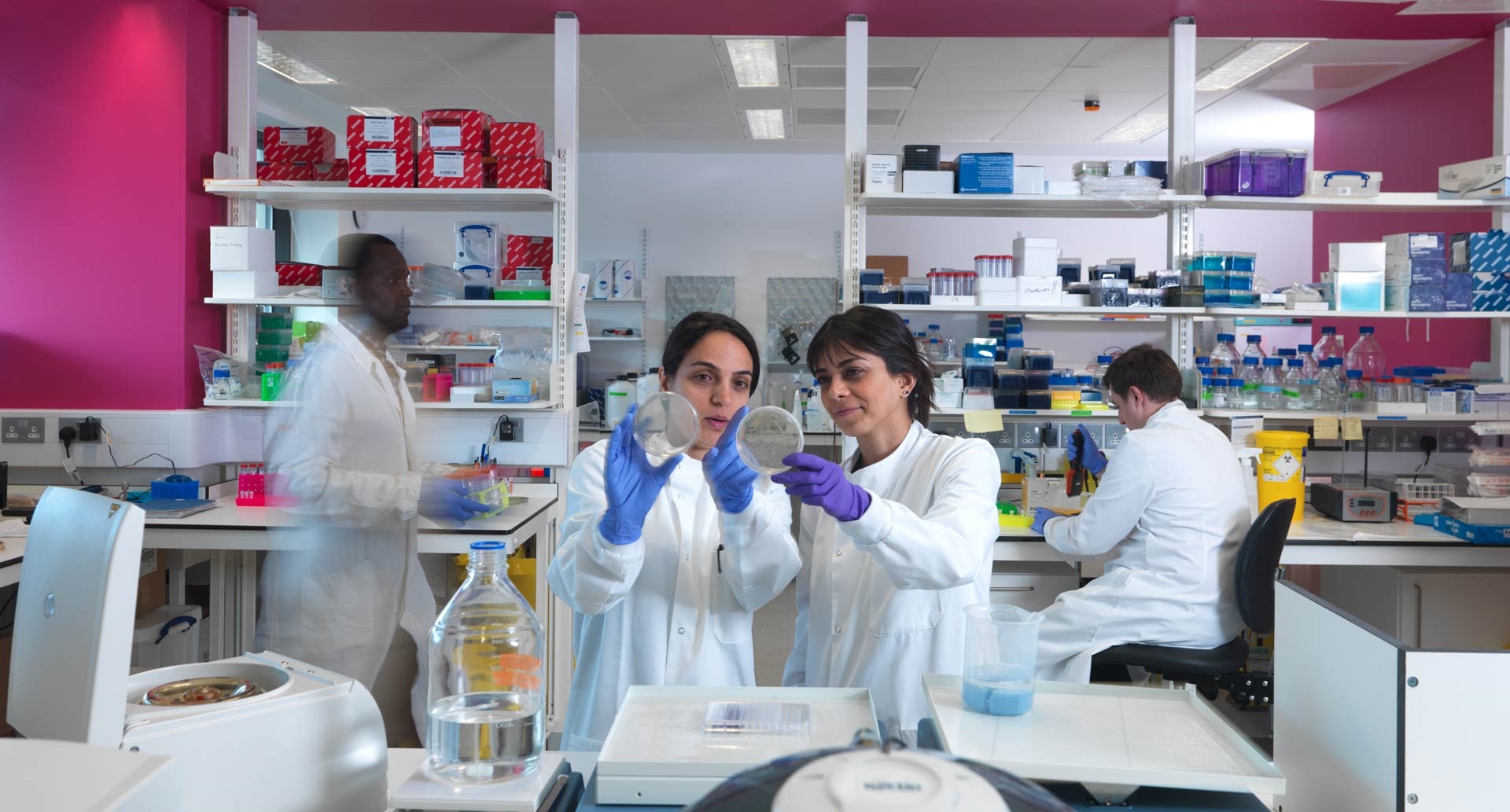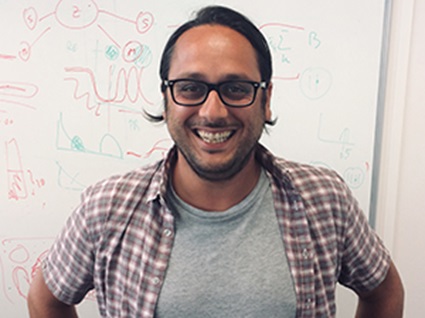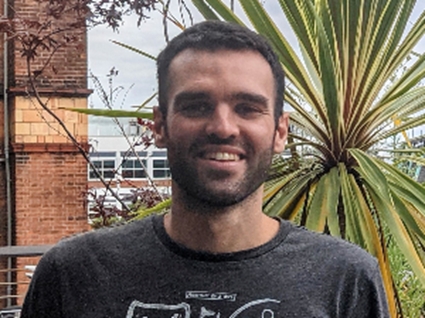Postdocs
As a postdoc at the ICR, you’ll be working at the forefront of cancer research, in an environment that’s collaborative, international and inclusive.
We aim to attract the best scientific minds, wherever in the world they come from. With postdocs from all over the UK and the world, you'll be joining a welcoming community that prioritises training the next generation of world-leading researchers. You’ll also benefit from our strong links with our partner hospital, The Royal Marsden NHS Foundation Trust, as well as our links with companies through industrial partnerships.
Benefits and culture
We offer a competitive salary, rigorous training, many opportunities for professional development, and an open and inclusive working culture. Our PostDoc Association, faculty and learning and development team work closely to support postdocs.
We also offer generous annual leave and family-friendly policies that support parents, including stop the clock, which supports maternity leave during research.
Reimbursing your visa and other costs
Successful applicants will be able to claim the cost of their visa and of the immigration health surcharge (IHS) for themselves and for their dependants once they have joined. This is a taxable benefit. Applicants often find the UK visa application process to be less onerous than for some other countries, such as the United States.
We provide extensive training and development opportunities that will help prepare for your future career inside or outside academia.
Throughout your postdoc fellowship, you’ll be offered training and support to help you to develop your skills in key areas such as high-impact publishing, managing research projects, leadership and career planning.
Getting started
We run training sessions for new postdocs, as well as a postdoc buddy system to help you to settle into your new role. We normally pair you with someone from a different discipline, to broaden your network. We can also try to match you with someone who speaks your native language.
Training and support
As signatories of the Concordat to Support the Career Development of Researchers, we are committed to providing our postdocs with at least 10 days each year for their personal and career development. We offer a wide range of activities that you can tailor to your career stage, research interests and career ambitions. These include:
- On-the-job training – such as shadowing funding panels, grant writing, peer review, supervising and mentoring others, lab visits, committee membership and project-related placements.
- Informal opportunities – such as building professional networks, engaging with the ICR Postdoc Committee, participating in conference organising committees, mentoring (as mentor or mentee), and 1:1 career support with consultants employed by the ICR.
- Formal training and professional development courses – on topics ranging from supervisor training, writing and publishing, and statistics, to project management and entrepreneurship.
The Pathway to Independence – a competitive programme that we run in collaboration with the Wellcome Sanger Institute and CRUK, is also an option for postdocs who are aiming to become academic team leaders.
We also provide training on science communication and outreach to support your participation in our public engagement programme.
You'll be joining a diverse and talented community of postdocs who come to work here from all over the UK and the world.
We’ve around 150 postdocs working at the ICR from across dozens of countries around the world at any one time. Several groups can help you to settle in, build a social network and get involved with life at the ICR.
PostDoc Association
Our Postdoc Association (PDA) brings together postdocs across the ICR for professional and social events, which include away days and conferences. It provides a community for postdocs to feel connected and supported.
Join our networks
From our LGBT+ Network and our forum on race and ethnicity to sports clubs and seminars, you’ll have the chance to connect with like-minded researchers and build your network.
Our active Postdoc and Alumni LinkedIn group is also a great way to connect with others and get answers to common questions – from what it’s like to rent in London to how to set up a UK bank account.
Former ICR postdocs are also welcome to subscribe to Network, our alumni e-newsletter, so they can continue to feel part of our community even after moving on in their careers.
There are lots of reasons why early career researchers come to do a postdoc at the ICR. We spoke to some of our past and present postdocs to find out why they chose the ICR.
Employee stories
Vacancies at the ICR
Research Group Leader, ICR Clinical Trials and Statistics Unit (ICR-CTSU)
Department/Directorate Information: Division of Clinical Studies - Clinical Trials and Statistics Unit (ICR-CTSU) The ICR-CTSU is a Cancer Research UK-funded, internationally recognised methodologist led clinical trials unit, providing cancer-focused clinical trial research expertise. We lead pioneering, efficient, high-quality, and impactful trials across the phases. Our expertise ranges from experimental medicine early phase studies exploring biological efficacy to trials which may deliver widespread change to routine practice, underpinned by applied methodology to drive forward clinical trial innovation. See our clinical trials Role Summary The Group Leader will lead a component of ICR-CTSU’s portfolio of clinical trials research. The post holder will join an existing faculty and seek to further develop and grow the portfolio in line with ICR-CTSU’s overall strategy; taking responsibility for a number of ongoing trials as well as the development of new trials. There will be the opportunity to develop and grow a team including the potential for a Postdoctoral Training Fellow and/ or a Trial Manager. We seek an experienced statistician / biostatistician with a strong research interest in clinical trials methodology and a passion for direct involvement in the oversight and leadership of academic clinical trials. The successful candidate will work closely with the Director of ICR-CTSU to further enhance the Unit’s internationally recognised strength in clinical trial design, conduct and analysis. The post holder will be expected to make a substantial independent intellectual contribution to clinical trials projects and be proactive in leading and contributing to broad initiatives that enhance the overall effectiveness of ICR-CTSU. The appointee will contribute to the overall scientific life of the ICR including the newly established ICR/Royal Marsden Hospital’s Centre for Trials and Population Data Science, by providing mentorship to more junior colleagues and acting as an academic leader. We seek an individual who will work closely and collaboratively with other faculty/Group Leaders at the ICR and with international/national key opinion leaders to extend the breadth and depth of ICR-CTSU’s biologically rich clinical trials portfolio. In partnership with clinical opinion leaders, this individual will generate research funds to conduct and deliver clinical trials research at the international forefront. Presentation at national and international conferences, production of top-quality research outputs and substantial professional contribution to wider clinical trial network bodies are expected. Enthusiasm for team-based science in a collaborative interdisciplinary environment is essential. The appointment will be based on track record and the ability and willingness to engage in team science. The successful appointee will have access to ICR’s successful PhD training programme and core facilities. Key Requirements Higher degree (MSc or PhD) in medical statistics/biostatistics or an allied field (e.g. public health, epidemiology, data science) with relevant work experience Significant experience as a clinical trials, medical statistician or bio-statistician within the academic or commercial sector; a blend of both would be highly desirable A desire to apply existing and novel statistical methods to the requirements of a diverse range of statistical problems A broad understanding of cancer research Ability to lead a Clinical Trials Unit based research group As part of your online application, you will be required to upload your full CV which will pre-populate your application form, you will also be asked to attach the following documents and failure to do so will mean your application cannot be considered on this occasion: Lists of major publications, achievements, research grants and distinctions. A PDF of a maximum of five key publications, or other research outputs (e.g. patents) that best demonstrate previous productivity or a single document giving hyperlinks to these outputs. You must also complete the personal statement section of the application form in the format of a cover letter including the names and contact details of three academic referees Joining as a Group Leader, you will be given outstanding support to help you to continue to develop in your career. Along with a start-up package of funding, you will also have access to resources to establish your group, including support for recruiting key group members, such as PhD students and postdoctoral researchers. We encourage all applicants to access the job pack attached for more detailed information regarding this role. For an informal discussion regarding the role, please contact Professor Emma Hall ([email protected])
Group Leader in Cancer Stem Cell Biology
Key Requirements As part of your online application you will be required to upload your full CV which will pre-populate your application form, you will also be asked to attach the following documents and failure to do so will mean your application cannot be considered on this occasion: Lists of major publications, achievements, research grants, distinctions. Research plan (five to six pages outlining your current research interests and research programme for the next 5 years) A PDF of a maximum of five key publications, or other research outputs (e.g. patents) that best demonstrate previous productivity You must also complete the personal statement section of the application form in the format of a covering letter including the names and contact details of three academic referees Department/Directorate Information: Cancer Biology Information The Institute of Cancer Research (ICR) in London seeks to appoint a Group Leader in Cancer Stem Cell Biology to play a pivotal role in advancing our cutting-edge cancer research. The position will be based in newly-refurbished laboratory and office space at our Sutton campus within the Division of Cancer Biology. We welcome applications at both the Career Development Faculty and Career Faculty levels. The ICR is one of the world’s most influential cancer research institutions, with an outstanding track record of achievement dating back more than 100 years. In addition to being one of the UK’s leading higher education institutions for research quality and impact, the ICR is consistently ranked among the world’s most successful for industry collaboration. As a member institution of the University of London, we also provide postgraduate higher education of international distinction. One of the ICR’s key research strategies is to defeat cancer by viewing it as a dynamic ecosystem. We aim to solidify our expertise in the biology of cancer stem cells. The postholder will significantly contribute to understanding the underlying biology of cancer stem cells and how this may be exploited to address key questions in tumour relapse, disease progression and metastasis. The successful candidate will have a compelling research programme focused on cancer stem cell biology in an area which complements existing disease-specific expertise at the ICR / Royal Marsden NHS trust. Possible areas of research include (but are not restricted to) basic mechanisms of self-renewal and pluripotency, regulation of cancer stem cell fate / differentiation, how they remodel the tumour microenvironment into a supportive niche, targeting treatment resistance of cancer stem cells, and the role of CSCs in driving the metastatic cascade. Applicants must have an internationally recognised track record of leading research in cancer stem cell biology, demonstrated by high-quality publications and significant funding success. For more junior candidates, an outstanding postdoctoral track record in cancer research, coupled with a compelling research vision in a strategic area of cancer stem cell biology and clear potential to secure competitive external funding, is essential. If you would like to informally discuss this position, please contact Professor Chris Jones ([email protected]), Head of the Division of Cancer Biology at the ICR.
Postdoctoral Training Fellow - Telomere Biology
We are seeking to recruit a highly motivated Postdoctoral Training Fellow to examine mechanistic aspects of telomeres under the guidance of Dr Max Douglas. The successful candidate will use a multidisciplinary approach that combines reconstitution biochemistry, cryo-EM and genetics to examine the processing and protection of telomeric ends, building on recent work from the Telomere Biology group (Eickhoff et al, Nature 2025). About you The successful candidate must have: PhD in biochemistry, cell biology, molecular biology or similar Strong publication record in molecular cell biology, biochemistry, biophysics or structural biology, as demonstrated by good first author publications Considerable experience in cell and molecular biology (including recombinant DNA techniques) Familiarity with biochemical techniques and experimental approaches Proven ability to design and implement experiments Candidates who are nearing completion of their PhD may apply, but confirmation on awarded PhD is required within 6 months of employment. The ICR has a workforce agreement stating that Postdoctoral Training Fellows can only be employed for up to 7 years as PDTF at the ICR, providing total postdoctoral experience (including previous employment at this level elsewhere) does not exceed 7 years. For general information on Postdocs at The ICR, more information can be found here. Telomere Biology Group The Telomere Biology Group, led by Dr Max Douglas, studies telomere replication using a multidisciplinary approach that combines biochemistry, biophysics and genetics. We aim to understand how telomeres are inherited from one generation of cells to the next and how defects in this process contribute to human diseases including cancer. What we offer A dynamic and supportive research environment Access to state-of-the-art facilities and professional development opportunities Collaboration with leading researchers in the field Competitive salary and pension We encourage all applicants to access the job pack attached for more detailed information regarding this role. For an informal discussion regarding the role, please contact Dr Max Douglas at [email protected].
Postdoctoral Training Fellow in Hypoxia and Leukaemia Biology
Under the guidance of Professor Kamil Kranc, we are seeking to recruit a Postdoctoral Training Fellow to pursue therapeutic targeting of the cellular oxygen-sensing system in order to eliminate leukaemic stem cells in acute myeloid leukaemia (AML) and develop effective treatments for this devastating disease. We have identified inhibition of hypoxia-inducible factor (HIF) hydroxylases (PHDs) as a promising non-toxic strategy to target leukaemic stem cells by modulating HIF signalling (Lawson/Holt-Martyn et al., Nature Cancer, 2024; Vukovic et al., Journal of Experimental Medicine, 2015; Vukovic et al., Blood, 2016). The postholder will investigate how inactivation of PHDs and related enzymes impacts AML biology, identify AML subtypes sensitive to these interventions, evaluate novel small-molecule inhibitors in vivo, and discover synthetic lethal vulnerabilities and resistance mechanisms to inform optimal combination strategies and overcome therapeutic resistance. About you The successful candidate must have: PhD in hypoxia biology, biochemistry, cell biology, molecular biology, stem cell biology, oncology or chemical biology. Significant experience in hypoxia biology/biochemistry, stem cell biology, and cancer research. Previous postdoctoral experience in hypoxia and/or leukaemia biology. Candidates who are nearing completion of their PhD may apply, but confirmation on awarded PhD is required within 6 months of employment. The ICR has a workforce agreement stating that Postdoctoral Training Fellows can only be employed for up to 7 years as PDTF at the ICR, providing total postdoctoral experience (including previous employment at this level elsewhere) does not exceed 7 years. For general information on Postdocs at The ICR, more information can be found here. Department/Directorate Information: The Haemato-Oncology Group specialises in understanding and targeting leukaemic stem cells, which are responsible for AML initiation, disease progression, relapse, and resistance to conventional therapies. Our group focuses on discovering cures for acute myeloid leukaemia with an aim to identify novel therapeutic targets for selective elimination of LSCs, without disrupting normal haematopoiesis. What we offer A dynamic and supportive research environment Access to state-of-the-art facilities and professional development opportunities Collaboration with leading researchers in the field Competitive salary and pension We encourage all applicants to access the job pack attached for more detailed information regarding this role. For an informal discussion regarding the role, please contact Professor Kamil Kranc via email [email protected]


